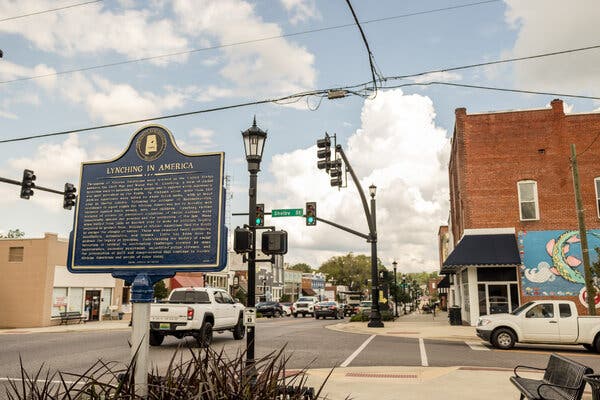Advertisement
The race for mayor in Montevallo used to be low-key and nonpartisan. In the Trump era, one candidate learned the hard way that’s no longer the case.

MONTEVALLO, Ala. — Perhaps no one was more surprised to learn that Joyce Jones wanted to defund the police than Joyce Jones herself.
On Aug. 11, Ms. Jones was in the final stretch of her campaign for mayor of Montevallo, a town of 6,674 people in central Alabama, when she appeared in a candidate forum alongside her opponent, Rusty Nix. The moderator asked both candidates how they would work with the town’s police department. Ms. Jones said she was grateful for the work of Montevallo’s law enforcement, and that as mayor she would consider adding social programs to help the town not just respond to crime (of which there is little in Montevallo) but prevent it, too.
She awoke the next morning to find her phone clogged with social-media notifications. “‘Defund the police,’” she remembered. “It was like a wildfire.” Citizens on one of the local Facebook groups accused Ms. Jones, who was running to be the town’s first Black mayor, of using the “same language” in her answer as the Black Lives Matter movement, implying that she had a hidden agenda. “Very few people will actually say ‘Defund the police,’” one man warned.
Montevallo’s elections are nonpartisan, and there was a time when they felt that way. Candidates would run on proposals like updating the sewage systems, beautifying Main Street and starting a townwide recycling program.
But as Ms. Jones, a 44-year-old lifelong Montevalloan, was finding, not even her tiny town was immune from the divisions roiling the Trump era, the political tremors that once would have felt out of place in casual conversations at Lucky’s supermarket, not to mention local elections, but that now seemed to color everything.
Ms. Jones tried to quash the rumors. She posted on her campaign’s page about her daughter in the Alabama National Guard, her niece and nephews in law enforcement, how she did not believe in “de-funding the Montevallo PD.” But the falsehood continued to ricochet across social media. One man shared a photo of activists in Austin, Texas, holding a giant black-and-white “Defund the police” banner, captioning it, “Montevallo’s future if liberals keep getting elected.”
For Ms. Jones, it was but one partisan-inflected battle in a campaign season of many, an election that would go on to mirror national fights over poll watchers and targeting of Black voters; include sobbing staffers, charges of racism and warnings of Marxism; and culminate in an unsettling feeling among many that, by the time the final vote was counted on the evening of Aug. 25, something in the town had been lost.
“It has always been in my heart this center of civility,” said Montevallo’s outgoing mayor, Hollie Cost. “Before the age of Trump, before all” — she paused — “this, whatever this even is, we all got along. It just ripped us apart.”
It’s not as though Montevallo was tension-free before 2020. There had always been those who felt the town’s leaders catered too much to the University of Montevallo, the local college. But it was the campus’s thriving arts scene and vocal L.G.B.T.Q. community that had long given the town a progressive sheen, at least relative to most other places in the rural Deep South.

Ask many in Montevallo about when things in town began to feel different, and they’ll point to the evening of March 5, 2019, when the town’s historic preservation commission, of which Ms. Jones was a new board member, gathered for its monthly meeting.
Faculty members from the university were scheduled to tell the story of the night some 130 years ago when two Black men were lynched in Montevallo, and propose the installation of a marker, funded by the Equal Justice Initiative in Montgomery, on Main Street. The commission had opened the meeting to the whole of Montevallo.
On Sept. 1, 1889, according to The Montgomery Advertiser, a mob had accused the two Black men of killing a local white man. After a nightlong search, the mob captured the men; one confessed to the crime, the other denied involvement. The mob hanged them from a tree.
When the presentation concluded, the outcry began. “The reaction was immediately, ‘This wasn’t a lynching. This was frontier justice,’” recalled Paul Mahaffey, a Black professor who had helped put the presentation together.
Many at the meeting wanted to know why Montevallo, which is 73 percent white, should “memorialize murderers” — meaning the Black men, not the mob — and why they weren’t also considering a marker for the white man who had been killed. Ms. Jones, other than Dr. Mahaffey, was the only Black person present. “I remember wanting to say things like, ‘Y’all, this isn’t just about these two men.’”
But she stayed mostly mum. Ms. Jones was used to being the only Black woman in the room; she wasn’t used to feeling like it. “For probably the first time as an adult, I felt like, ‘These people don’t want me here.’”
After the meeting, many of the historic commission’s members began to resign. Ms. Jones suddenly found herself the de facto chair. In August 2019, after she wrangled enough members for a quorum, the commission approved the marker’s installation. Shortly after, the City Council, composed largely of university faculty and staff, also approved the measure.
The dustup led Ms. Jones, a mother of four whose husband is a Baptist preacher, to consider a run for local office. She believed a campaign centered on inclusion, on ensuring no one would ever again feel as she had on that March night, could do some good. She announced her candidacy at a City Council meeting on June 8, the day of the marker’s unveiling. And Mr. Nix, who had been the lone councilman to vote against it, would be her opponent.
Ms. Jones quickly sensed how the presidential race would loom over her own. In her first round of door-knocking, she introduced herself to an older white man. He had one question: Who was she voting for in November, Donald Trump or Joe Biden?
Ms. Jones responded with what would become her version of a stump speech — that mayoral elections were nonpartisan, that her slogan was “One Montevallo.”
Sure, he said. But he was a conservative, and he only voted for conservatives, and she hadn’t answered his question. When Ms. Jones said she’d prefer not to discuss it, he nodded. “Well,” he said, “that tells me about all I need to know.” He shut the door.
That moment set the tone for the months to come: The white man who asked if she was a liberal who planned to take his guns, the Black woman who asked for assurance that she did not support Mr. Trump. But if Ms. Jones tried to de-emphasize the notion of “sides” — no city official could take his guns, she promised; the election was nonpartisan, she reiterated — Mr. Nix seemed to embrace it.
Mr. Nix, who is white and also a lifelong Montevalloan, had been on the City Council for more than a decade. Early in the campaign, he teamed up with other City Council candidates to form a joint ticket of sorts, something that no one in Montevallo said they’d ever seen in their elections. They clustered their signs across town, sent out mailers and hosted meet-and-greets under the same banner: the Conservative Coalition.
Mr. Nix did not respond to interview requests for this article. But according to Chris Brown, a Birmingham-based Republican consultant hired by Mr. Nix, the coalition offered an alternative to the “progressive” path they thought the town was taking.
“There was a dynamic shift in the culture,” said Mr. Brown. “I think Rusty Nix saw the opportunity.”
Indeed, an increasingly vocal contingent of Montevalloans believed the local government was more interested in promoting things like “identity politics” and “cancel culture” than improving the town. The Conservative Coalition suggested whose leadership they might emulate instead: During the Aug. 11 mayoral candidate forum, one member wore a Trump 2020 hat with his Nix campaign T-shirt.



